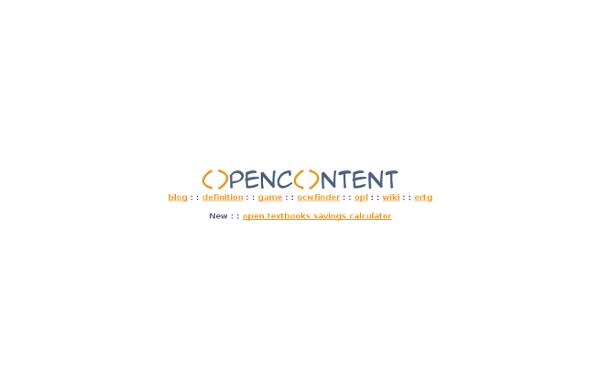



50 Excellent Open Courses on Teaching With Technology | Mr. Walker's Technology Blog The information below is taken from a recent posting on www.onlinecollegesanduniversities.com. It is a listing of 50 free online courses that are offered on a wide variety of instructional technology topics. The courses are free, self-directed, and accessible over the internet. Using technology and creating unique learning environments are two big dreams that all types of teachers have, from elementary educators to distance education teachers to college professors. Technology and Learning Find out why technology is such a draw for educators and how we learn from non-human tools. Blogs, Wikis, New Media for Learning: This course will show you how blogs and other new media are optimal teaching tools. Online Education and Distance Learning If you want to create online learning environments and manage a distance ed course, look here. Creating Open Educational Resource: Learn how to write learning units that enhance self-directed learning. Younger Students Tech Tutorials
USAL. Universo Abierto Wikibooks OpenAIRE 16 de Marzo de 2010 Europe, and the EU member states, already have a strong tradition in Open Access, both in building infrastructures for Open Access repositories and stimulating the establishment Open Access journals and transition of traditional publishing to Open Access. Open Access Repositories in Europe The DRIVER project helped to establish and develop repositories in each of the European countries, and stimulated Open Access archiving by promoting policy development at the national level. Open Access publishing in Europe There is a growing number of Open Access Journals; most disciplines are now represented. OpenAIRE and the European initiatives The NOADs of OpenAIRE Most of the EU member states have built expertise on OA. The OpenAIRE network of Open Access desks is structured similarly to the Europe-wide information network on European Research Programmes. Please click on one of the countries in the list (left) for further information on:
Student Research: Can Googling Replace $168 Intro to Psych Textbook? Electronic Textbooks | News Student Research: Can Googling Replace $168 Intro to Psych Textbook? By Dian Schaffhauser02/16/11 Students are taking the battle against high-priced textbooks into their own hands. The research effort was undertaken as part of the Digital Bookshelf Project, the University System of Ohio's effort to make textbooks more affordable. For the latest research project, which took place in fall 2010, the students compared the value and educational quality of two current textbooks with the draft of a new textbook they found free online, along with what they could find through online search engines. "For our generation raised on the Internet, online searches for class materials often replace purchasing the textbook," said Libby Cates, one of the student researchers. They found that materials from Wikipedia were accurate and thorough, though "perhaps excessively thorough for an introductory course," they reported. About the Author
PLoS Free Textbooks Internet Library SPARC Europe Spotlight on E-Learning Education Week's Spotlight on E-Learning brings together a collection of articles hand-picked by our editors for their insights on: Understanding different models of online learningChoosing the right e-learning companyIncreasing access and equity in digital learningHow elementary schools incorporate e-learningParental involvement in online educationWhat works best for classrooms that blend face-to-face and virtual learningNew standards outlining online-course design Elementary school online students need remediation or acceleration at junctures in their development some say are more crucial than any in high school. January 7, 2011 - Education Week Distinguishing between the wide variety of virtual schools and online-learning programs available involves understanding the type of operational control. April 23, 2010 - Education Week Even advocates concede that full- time virtual education might not be a good fit for students with both parents working outside the home.
Open educational resources UNESCO believes that universal access to high quality education is key to the building of peace, sustainable social and economic development, and intercultural dialogue. Open Educational Resources (OER) provide a strategic opportunity to improve the quality of education as well as facilitate policy dialogue, knowledge sharing and capacity building. Open Educational Resources are teaching, learning or research materials that are in the public domain or released with an intellectual property license that allows for free use, adaptation, and distribution. In 2001, the Massachusetts Institute of Technology (MIT), in an unprecedented move, announced the release of nearly all its courses on the internet for free access. With the support of the Hewlett Foundation, UNESCO created a global OER Community wiki in 2005 to share information and work collaboratively on issues surrounding the production and use of Open Educational Resources.
The Cape Town Open Education Declaration Open Access Timeline Physical Review X 4 May 2011 American Physical Society officially launched PRX, a online-only, open access journal, Scientific Reports 6 Jan 2011 Nature launched Scientific Reports, online and open access journal covering all areas of the natural sciences PLoS ONE 21 Dec 2006 An interactive open-access journal for the communication of all peer-reviewed scientific and medical research Scholarpedia 1 Feb 2006 Scholarpedia is a peer-reviewed open-access encyclopedia written by scholars from all around the world Science Commons 1 Jan 2005 A project of Creative Commons to make scientific research “re-useful” and integrate fragmented information sources. Google Scholar 18 Nov 2004 Google announced the launch of Google Scholar. Elsevier 3 Jun 2004 Elsevier liberalizes copyright for authors CrossRef 28 Apr 2004 An infrastructure for linking citations across publishers, and a full-scale implementation of the Digital Object Identifier (or DOI) System to date. Berlin Declaration 22 Oct 2003 PLoS Biology 13 Oct 2003 Citebase